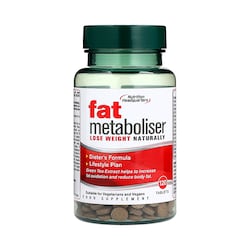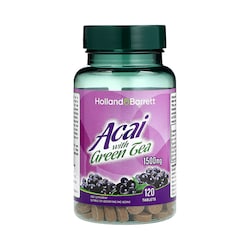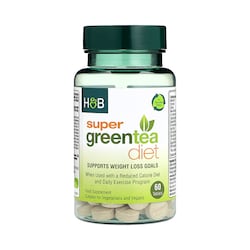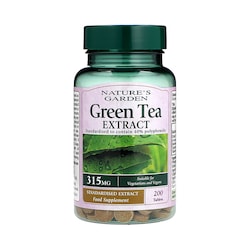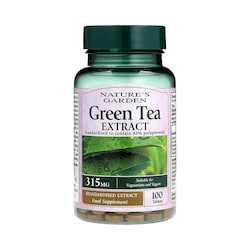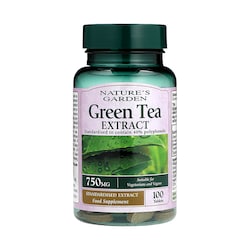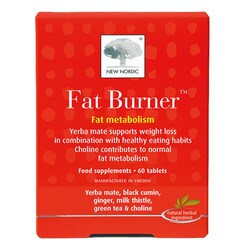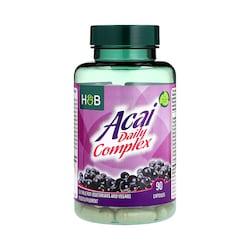20% off €35
Your guide to appetite suppressants

Appetite suppressants are used to help people lose weight – if you feel less hungry, then you eat less which, over time, will leave you feeling lighter.
There are various different types of appetite suppressants out there, which range from appetite suppressants to manufactured suppressants. Some work by reducing your appetite, while others work by blocking the absorption of certain nutrients or increasing the number of calories you burn.
If you’ve heard of appetite suppressants, but aren’t sure about what they are, how they work, or the side effects of taking them, keep reading this article for further details.
What are appetite suppressants?
Appetite suppressants are a form of medication that trick the brain into thinking your stomach’s full when it isn’t. They work by sending these messages to the neurochemical transmitters within the central nervous system.1 They target two key neurotransmitters in particular - serotonin and norepinephrine.
Increased levels of serotonin result in a feeling of fullness. While increased norepinephrine levels stimulate the central nervous system, reducing appetite.2
Certain appetite suppressants are available on prescription and are usually taken alongside a healthy diet and regular exercise. Examples of this form of suppressant include Phendimetrazine (Bontril), Diethylpropion (Tenuate), Benzphetamine (Didrex), Phentermine (Adipex-P, Fastin), Sibutramine (Meridia) and Orlistat (Xenical, Alli).3
There are also non-prescription suppressants, which are more commonly known as natural appetite suppressants. They tend to work by reducing your hunger levels (more on these suppressants below).
Some suppressants are taken on a short-term basis and others are taken long-term. The results widely differ from person-to-person, depending on their individual circumstances, plus the fact how much we eat isn’t just determined by our hunger levels.
Summary
- There are prescription appetite suppressants and there are natural appetite suppressants
- Prescription suppressants are a form of medication that trick the brain into thinking your stomach’s full
- Suppressants tend to work by reducing hunger levels
What will suppress my appetite?
Both prescription and natural appetite suppressants can help with this, several of which we’ve listed below. Incorporating some of these tactics into your everyday routine may help suppress your appetite too:4
-
Eat small
We don’t just mean smaller portion sizes. Research carried out by Arizona State University found that cutting food into smaller pieces boosts satiety more than eating one larger piece of food. College students who were given a bagel ate more of it and consumed more calories at a subsequent meal than those who were served the same bagel in four pieces.
-
Exercise regularly
In one Brazilian study, researchers found that in addition to burning calories and boosting metabolism, exercise can restore the sensitivity of neurons involved in satiety, which naturally reduces food consumption. Meanwhile a separate study by the University of Exeter found taking a 15-minute walk, rather than a 15-minute break, reduced work snacking by 50%.
-
Have breakfast
Eating breakfast has been proven to kickstart your metabolism. Research has found people who miss breakfast eat 40% more sweets, 55% more soda, 45% fewer vegetables and 30% less fruit than those who do.
-
Eat slowly
A study published in the Journal of Clinical Endocrinology & Metabolism found that eating too quickly prevents the release of hormones that make us feel full, which can trigger mindless overeating. Another University of Rhode Island study found that slow eaters consume around four times fewer calories per minute, and experience a higher level of satiety, despite eating less food.
Handpicked content: ‘Mindful eating: What is it?’
-
Memorise meals
Scientists from the University of Birmingham explored how remembering their lunch influenced the amount of salty or sweet snacks eaten later that day. Volunteers who were asked to recall their lunch ate less of the unlimited treats they were invited to snack on.
Summary
- Prescription appetite suppressants and natural appetite suppressants can help suppress appetite
- So too can several simple, but highly effective everyday ‘tricks’
- They range from cutting up your food in smaller portions and always eating breakfast, to eating slowly and thinking about what you’ve eaten before you eat again
14 natural appetite suppressants
Rather than taking a prescription suppressant, some people prefer a natural type of appetite suppressant. They come in the form of both food and drink that work by helping you stay full, mainly because they’re packed full of nutrients. Let’s take a look at some of them:5
-
Almonds
Almonds are a valuable source of antioxidants, Vitamin E and magnesium, which all happen to be appetite suppressants too. Insight shared with Obesity Society found that almonds have a proven ability to increase feelings of fullness and help people manage their weight.
-
Avocado
Because they’re full of fibre and heart-healthy monounsaturated fat, avocados can help suppress appetite. What’s more, you don’t have to eat too many of them to help with appetite suppression either. They work by telling your brain to signal to your stomach that it’s full.
-
Coffee
Drinking coffee in moderation (one or two cups a day) can boost increase metabolism and suppress appetite, thanks to its caffeine content and antioxidant properties.
Handpicked content: ‘Bulletproof coffee benefits.’
-
Ginger
Ginger works as a stimulant that energises the body and improves digestion which, in turn, can help leave you feeling less hungry.
-
Cayenne pepper
According to research in the Physiology and Behaviour Journal, half a teaspoon of cayenne pepper can boost metabolism and encourage the body to burn an additional 10 calories.
-
Eggs
Research has found that eating one or two eggs for breakfast can help you feel more full over 24 hours than if you eat a bagel with the same amount of calories. What’s more, the same research also found that people who ate eggs, ingested an average of 330 fewer calories over the course of a day compared to those who ate just bagels.
-
Apples
All types of apples can suppress appetite because they contain pectin, which help you feel full. They also regulate glucose and boost energy levels. And, because you have to chew them quite a bit to eat them, it gives your body more time to realise you’re hungry.
-
Water
We all know drinking water helps keep our entire body hydrated, but a study carried out in 2010 also found that people who drank two glasses of water before a meal ate between 75 and 90 less calories than those who didn't drink water.
-
Sweet potatoes
This type of potato happens to contain a certain type of starch that resists digestive enzymes, making them stay in your stomach longer and keep you fuller for longer, which helps suppress appetite.
-
Dark chocolate
Dark chocolate – 70% cocoa content and above – has been proven to lower cravings. The bitter taste signals to your body to reduce your appetite. What’s more, the stearic acid that’s found in dark chocolate helps slow digestion to help you feel fuller longer.
-
Tofu
Tofu is the ultimate appetite suppressant because it’s high in an isoflavone called genistein, which has been shown to suppress appetite and reduce food intake.
-
Green tea
The catechins in green tea help to inhibit the movement of glucose into fat cells, which slows blood sugar rises and prevents high insulin and subsequent fat storage. Overall, stable blood sugar levels = stable hunger levels.
Handpicked content: Does green tea help you lose weight?
-
Wasabi
A bit like dark chocolate with its bitter taste, the spiciness in wasabi makes it an appetite suppressant and a anti-inflammatory.
-
Oats
Oats are packed full of soluble fibre, which turns into a gel-like substance when dissolved with water. Inside the body, this ‘gel’ literally helps fill us up for longer. Oats tend to work best when made with water or milk, as the liquid really thickens them up.6
Handpicked content: ‘Why are oats good for you? Six amazing health benefits.’
Summary
- Certain food and drink products can acts as appetite suppressants
- They work by helping you stay full mainly because they’re packed full of nutrients
- Appetite suppressants include green tea, oats, avocado and almonds
Prescription appetite suppressants
In addition to appetite suppressants, there are numerous prescription appetite suppressants that tend to work by reducing and targeting hunger. They include:7
-
Belviq
Also known as Lorcaserin, this suppressant controls appetite and metabolism by activating serotonin receptors that regulate hunger. As a result, it may help you feel full after you've eaten less food. It’s given to people with a BMI of 30 or a BMI of 27 and an obesity-related condition.
-
Phentermine
Is one of the oldest medications for weight loss and is also referred to as Adipex-P, Lomaira and Suprenza. There are certain side effects linked to this particular suppressant, which include increased blood pressure and heart rate, sleeplessness and nervousness.
-
Contrave
Contains a combination of naltrexone hydrochloride and bupropion hydrochloride. It reduces appetite and curbs cravings by targeting the central nervous system. It’s usually prescribed alongside a reduced-calorie diet and exercise programme.
-
Qsymia
A combination of phentermine and topiramate, Qsymia is an extended-release capsule that suppresses appetite and reduces food intake. It tends to be prescribed to people with a BMI over 30 or a body mass index of 27 and a weight-related condition. It needs to be taken alongside making lifestyle changes that will help aid weight loss, e.g. regular exercise and a healthy diet.
-
Saxenda
Is an injectable medicine that helps people feel full sooner so they eat less and lose weight. Saxenda is often prescribed to obese patients (with a BMI of 30 or more) or to patients, who have a BMI of 27 or more and a weight-related medical condition, such as type 2 diabetes, high cholesterol or high blood pressure.
Summary
- In addition to appetite suppressants, there are numerous prescription appetite suppressants that most commonly work by reducing and targeting hunger
- They include phentermine, which is one of the oldest weight loss medications
- Meanwhile, Qsymia is an extended-release capsule that suppresses appetite and reduces food intake

30 of the best fat burning foods and drinks
Side effects of appetite suppressants
Some people may experience side effects when taking appetite suppressants, which tend to vary, depending on the type of hunger suppressant they’re taking.8
Side effects of prescription suppressants that stimulate the nervous system to reduce appetite include:
- Pulmonary hypertension - a rare and potentially fatal disorder caused by high blood pressure in the arteries of the lungs
- Valvular disease of the heart
- Elevated blood pressure
- Increased pulse and heart rate
- Restlessness
- Dizziness
- Insomnia
- Dry mouth
- Constipation
Other side effects commonly associated with suppressants that work by increasing levels of serotonin and norepinephrine, include:
- Headache
- Dry mouth
- Anorexia
- Constipation
- Insomnia
- Runny nose
- Sore throat
Meanwhile, appetite suppressants that work by preventing fat absorption in the gut can cause:
- Diarrhoea
- Oily stools
- Gas
- Flatulence
Summary
- Side effects tend to vary, depending on the type of appetite suppressant you’re taking
- Prescription suppressants that stimulate the nervous system to reduce appetite tend can cause several heart-related and wider side effects
- Common side effects associated with suppressants that work by increasing levels of serotonin and norepinephrine, include headache, dry mouth, constipation and insomnia
Takeaway
If you are planning on using appetite suppressants to help you lose weight, it’s important you do your research rather than just simply jumping straight in and using them. As you may have gathered from the lists of different types of suppressants covered above, particularly the prescription suppressants, they all work in different ways.
Always speak to your GP first before taking appetite suppressants and if you’re thinking about going down the appetite suppressant route, start with just one or two food or drink items at a time and see how your body responds to them and the difference they make to your weight loss.
It’s also worth bearing in mind that everybody’s body is different; not everybody sees exactly the same results from taking prescription or appetite suppressants.
Last updated: 24 May 2021

How to lose weight fast – and safely
- https://www.verywellfit.com/appetite-suppressants-3496076
- https://www.rxlist.com/weight_loss_medications/drugs-condition.htm#loss
- https://www.rxlist.com/weight_loss_medications/drugs-condition.htm
- https://www.health.com/nutrition/9-appetite-suppressants-that-actually-work
- https://www.shape.com/healthy-eating/diet-tips/top-25-natural-appetite-suppressants/
- https://www.byrdie.com/natural-appetite-suppressant-5081096
- https://www.verywellfit.com/appetite-suppressants-3496076
- https://www.rxlist.com/weight_loss_medications/drugs-condition.htm#loss



